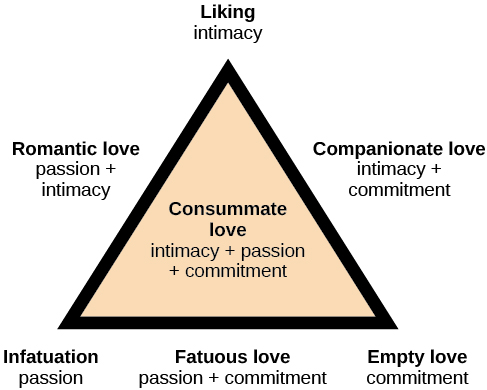According to Sternberg’s Love Theory, There are Three Components of Love: Commitment, Passion and Intimacy

Robert Sternberg proposed something that has taken hold of the interest of many – from his fellow psychologists to psychology enthusiasts. He had proposed a theory that concretizes something that has baffled many minds and wrenched many hearts: love.
He called it the triangular theory of love, as the theory is best explained in a form of a triangle, but it is more commonly known as the Sternberg’s Theory of Love. In the context of interpersonal relationships, there are three components of love: an intimacy component, a passion component, and a commitment component.
The first component talks about intimacy. According to the theory, it is the feeling of attachment, closeness and connectedness. The second component is the passion, the firey depth and intense feeling you get when you like someone. It encompasses the drive connected to both limerence (romantic attraction) and sexual attraction. Commitment comes in to tie the two together. It is a decision to remain with one another (short term) and plans made in the future (long term).
The forms of love are combinations of the three components that was described above. According to this theory, it takes 6 manifestations and they are as follows.
- Nonlove: It is merely the absence of the three components. This basically characterizes the majority of our personal relationships, which are simply casual interactions. It could apply to your acquaintances or someone you’re not particularly attached with.
- Friendship: This is characterized when intimacy is present. This is the set of feelings one experiences without the intense feeling of passion or commitment in the romantic sense. This can however be a root for the other forms of love to manifest.
- Infatuated Love: It is called infatuation when passion is present, and both liking and commitment is absent. Crushes (whether celebrity or not) fall under this category. People with nothing but a sexual relationship with each other also manifest this category, as they are only bounded by carnal desires and nothing more. This is the most common root of romantic love, as it is believed that intimacy develops over time. But if neither intimacy nor commitment is develop, this can fizzle over time.
- Empty Love: An example of this is an unhappy marriage, where the intimacy or the liking for the spouse is gone, and the flames of passion have already been put out a long time ago; nothing left but the contract of marriage itself. Empty love is characterized by the absence of passion and intimacy despite the presence of commitment. A strong love may deteriorate into empty love. And if we flip the spotlight to arranged marriages; going into the marriage, it can be categorized as empty love, which can seep into another form of love over time.
- Romantic Love: This form of love is a combination between intimacy and passion. Lovers who are under this category are said to not only be drawn and bonded physically, but emotionally as well. This is one of the most common stepping stones to a married life. In this kind of relationship, it lacks the commitment. So it’s a little bit easier to scrap it out when both of the parties involved have had enough of it, without all the legal issues to deal with.
- Companionate Love: It is characterized by the combination of intimacy and commitment, and the absence of passion. This is stronger than the friendship form because of the element of commitment. Companionate love is observed in long-term marriages, where you don’t exactly need the passion in order to stay in love with your partner, because the affection remained. It can also be observed among family members and close friends who have a platonic, but strong friendship.
- Fatuous Love: A very good example of a fatuous love is Kim Kardashian’s marriage to Kris Humphires, only to divorce him 72 days later. It’s the type of whirlwind romances that end up in our television sets. Fatuous love is just that. This type of love is the combination of commitment and passion without intimacy. With my example of Kim and Kris’ wedding, their marriage was not enforced by intimacy, plus they got married so soon, and publicly as well, that might be a contributing factor to the end of their short-lived married life.
- Consummate Love: This type of love sits at the very center of the triangle, because this is said to be the perfect and ideal type of love. All three components are present in this type of love and this is some sort of a goal for people who are in a relationship. According to Sternberg, these couples will continue to have a great sex life fifteen years or more into the relationship, they cannot imagine themselves happier over the long-term with anyone else, they overcome their difficulties gracefully, and each delight in the relationship with one other. However, Sternberg himself cautions that maintaining this relationship is harder than achieving it. And this is not a permanent form of love.
Sternberg had stressed the importance of communication in any kind of love. “Without love” he warns, “even the greatest love can die.”
With that, do you agree with the types of love that Sternberg had proposed? What other factors can affect a relationship? And are the six forms of love global? Or is there a subjective perspective for each couple out there? I’d love to hear back from you!






Such a long article on love !..what survives the test of time is love and what does not survive was just a make belief..let’s say u love some one who is very far from you and u Are loyal….but in the meanwhile u meet someone really special or extraordinary who takes your breath away then u will consider it to be an act of destiny and will consider a liaison with them..it’s ain’t cheating but simply meeting your destiny..let time decide who u r meant to be with..love is also a matter of will and faith but it’s gotta be mutual if it’s to survive..if one side becomes insincere then the other side too falls apart in no time….if it’s ain’t mutual then it’s nothing..as simple as it can be
My friendship is a combination of the friendship love, and companionate love. And I need to keep the bonds strong, so I can keep my best friends. Great insightful article.
The insight in this article was very helpful to me, since I am in counseling.
I want to differ on Sternburg ‘so theory on arranged marriages. There is no evidence to prove that these kind of marriages are less successful. Neither is there absolute proof that dating marriages are more successful. Both types are relative and subjective
educative,